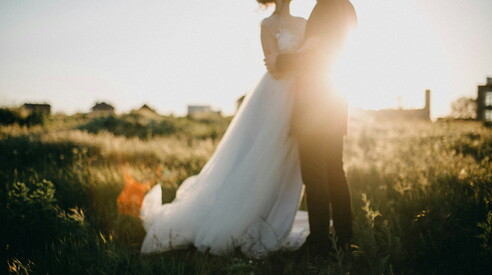August weddings and the illusion of having fun. We fall for it every time.


Photo by Anna Vi on Unsplash
the summer
Every time we think, "It's a reason to party, it won't be that hot." We take heart. But then that morning comes with thirty-three degrees and you start thinking of anything to escape.
On the same topic:
We look at August weddings like we look at those short walks barefoot across the sand on a summer afternoon: undervalued . Friends meet again and relationships are strengthened. After all, the anthropological meaning of ceremonies is precisely this: to strengthen bonds through codified norms to which we bear witness. In this way, the event, whether good or bad, is removed from the private sphere and made public: the transition of an individual or, indeed, a couple's status is made known to the community of reference. Although the role of weddings in social ordering has gradually diminished, given that in industrialized societies other types of social bonds also exist—such as the sharing of a mortgage—marriage still retains the religious and institutional dignity deriving from the celebration of a cult, a rite. Clearly, anything that has to do with ritual leaves little room for individual freedom of choice, which is why, one might believe, we attend weddings in August . "After all, it's a reason to celebrate," we tell ourselves. "It won't be that hot, and it's the perfect opportunity to wear the linen dress I bought last summer and only wore twice." "I'll see so-and-so again, I haven't seen them in years. I wonder how they're doing."
You know, you pluck up courage. Then the wedding day arrives, and at nine in the morning it's already thirty-three degrees. The pharmacy's display clearly reads forty-three, but you don't give that much thought; you always think the thermometer is set incorrectly, that the sun is shining too hard or too long, that it's stuck in 2003. You think of anything to preserve your sanity when you know you'll have to spend the whole day outside in that heat, like a missed update between solar and legal temperatures. Clearly, the car hasn't been washed, and you head off to the big event with embarrassing pigeon droppings on the roof and, if you're unlucky, even on the hood. However, if you're lucky, you'll arrive at your destination in thirty minutes at most, a destination usually represented by an eighteenth-century farmhouse with an adjoining sixteenth-century church, all built on an estate with trees so old that their trunks contain fragments of Napoleonic bombs. “How wonderful,” we say to ourselves, “it was worth it.”
The church is prettier from the outside, but at least it's cool inside. There's still no sign of the newlyweds, but finding a few friendly faces, we greet each other in that slightly awkward manner, partly due to the fear of looking ridiculous with all that elegance. A fear that should be felt, certainly not out of excessive elegance, by those who decide to wear white sneakers—calling them sneakers doesn't change the essence. The groom enters, and the sight of him already moves us a little. Then it's the bride's turn, and we can't help but notice how beautiful she is. If a cleric officiates the ceremony, we're on the safe side, because they may have their faults, but when it comes to ritualistic performance, they're unmatched. Then we go out and wait for the newlyweds to emerge, we toss the rice wrapped in pastel-colored packets distributed by the wedding planner, we laugh a lot, and we set off on foot to the restaurant—which, if we're still lucky, is just a few steps away.
The newlyweds end up in an unknown dimension, only appearing hours later. The guests are left free to mingle. Good luck. With all those shirts and heels, it's hard not to look comical when you approach the buffet tables hungry. Nature explodes. Prosecco and orange juice stimulate conviviality, and in fifteen minutes everyone eats with the same fervor with which Orlando tried to win Angelica's love. But no one spoils their appetite because sumptuous lunches are no longer served. Now the general rule is to try to eat as little as possible, and in fact, you rarely see gaunt faces around.
If you can't find a shady, well-ventilated spot, you'll sweat profusely. "It's so nice to see you again. How are you? Do you still live there, over there, or here?" You'll say anything to get your life back, and you'll listen to anything to get others to get theirs.
The newlyweds return smiling and relieved. They look for their table and head there, hoping to sit next to some friendly guests. The portions are small but delicious. Someone makes a speech, and the newlyweds' friends tell how genuine the love they've witnessed is. Sometimes there's a person designated to entertain the room, often poorly. The last course arrives, then the cake. The waiters can't wait to clear the table. The music gets louder, the first trains appear, everyone dances, and everyone can't be grateful enough for the open bar. But just as it starts to get going, the party ends. What a shame, just when the fun was just beginning.
More on these topics:
ilmanifesto





